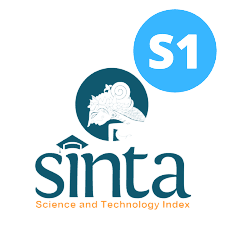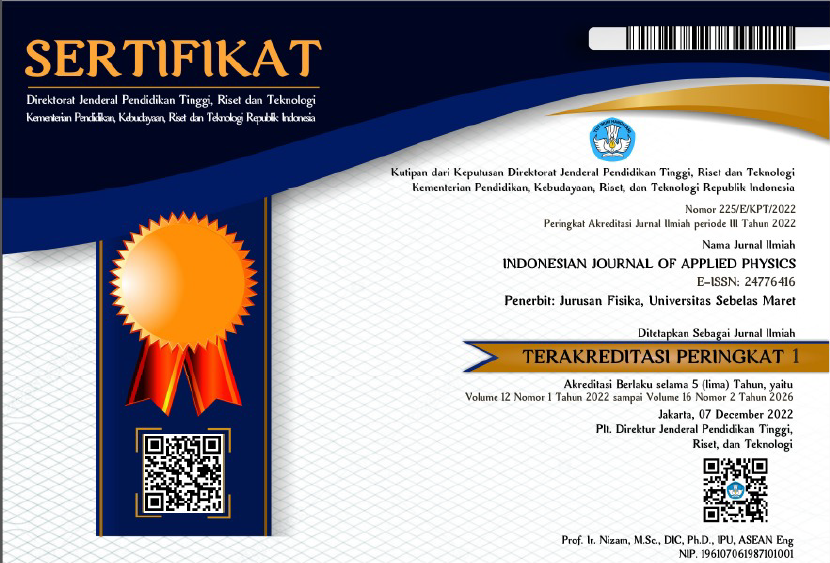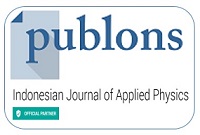Development of Web Based Learning Material in Physics Subject for Kalor and Temperature Material
Abstract
It has been done, the research which aims to develop a web-based teaching materials on the subjects of physics subject with subject mater of temperature and heat. This study using a modified model of the 4D development by eliminating the deployment phase. The validation of product development conducted by validator media experts and experts matter of physics, whereas small-scale trials conducted by physics teacher and 10 students. Validator review results stating that the quality of the product development were included in the category very well with the average percentage rating of 83.93%. The percentage value assigned by media expert by 75% in the good category and the percentage of the value provided by a matter expert 92.85% were in the very good category. Experiments by physics teacher to obtain result of equal to 94.44% were in the very good category and the average percentage of the test results by the students of 90.5% were in the very good category. The characteristics of the products developed include material composition using the curriculum in 2013, there was a recording facility and the results of evaluation of students' activities, there were feedback evaluation results were immediately known by the students and there were some links related to the material either youtube or other learning website.
Full Text:
PDFReferences
Rahayu, E., Susanto, H. dan Yulianti, D. 2011. Pembelajaran Sains dengan Pendekatan Keterampilan Proses untuk Meningkatkan Hasil Belajar dan Kemampuan Berpikir Kreatif Siswa. Jurnal Pendidikan Fisika Indonesia, Vol. 7, Hal. 106-110.
Mahmud, R. 2008. “Pembelajaran Berasaskan Web”. Dalam Isjoni dan Firdaus (Ed.), Pembelajaran Terkini: Perpaduan Indonesia-Malaysia. Yogyakarta: Pustaka Pelajar. 73-83
Sawant, B. S., dan Shinde, S. P. 2012. A Study of Effect of Web-Based Education Environment in Schools: With special reference to Satara District. International Journal of Soft Computing and Engineering (IJSCE), Vol. 1, Hal. 42-44.
Wijaya, M. 2012. Pengembangan Model Pembelajaran e-Learning Berbasis Web dengan Prinsip e-Pedagogy dalam Meningkatkan Hasil Belajar. Jurnal Pendidikan Penabur, Vol. 11, No. 19, Hal. 20-37.
Papastergiou, M., dan Gerodimos, V. 2012. Can learning of basketball be enhanced through a web-based multimedia course? An experimental study. Education Information Technology,Vol. 18, Hal. 459-478.
Cerra, P.P., Gonzalez, J. M. S., Para, B. B., Ortiz, D. R., dan Penin, P. I. A. 2014. Can Interactive Web-based CAD Tools Improve the Learning of Engineering Drawing? A Case Study. Journal Science Education Technology, Vol. 23, No. 3, Hal. 398-411.
Oliver, R. 2007. Engaging first year students using a Web-supported inquiry-based learning setting. High Education, Vol. 55, Hal. 285-301.
Erdogan, Y., Bayram, S. dan Deniz, L. 2008. Factors That Influence Academic Achievement And Attitudes In Web Based Education. International Journal of Instruction, Vol. 1, No. 1, Hal. 31-47. ISSN:1694-609X.
Thiagarajan, S., Semmel, D. S., dan Semmel, M. I. 1974. Instructional development for training teacher of expectional children. Bloomington Indiana: Indiana University.
Arikunto, S. 2006. Prosedur Penelitian. Jakarta: PT. Rineka Cipta
Blessing, O. O. dan Olufunke, B. T. 2015. Comparative effect of Mastery Learning and Mind Mapping Approaches in Improving Secondary School Students’ Learning Outcomes in Physics. Science Journal of Education, Vol. 3, No. 4, Hal. 78-84.
Setyadi, E., dan Komalasari, A. 2012. Miskonsepsi tentang Suhu dan Kalor pada Siswa Kelas 1 di SMA Muhammadiyah Purworejo, Jawa Tengah. Berkala Fisika Indonesia, Vol. 2, No. 1 & 2.
Giancoli, Douglas C. 2001. Fisika Jilid 1 (Terjemahan Yuhilza Hanum). Erlangga: Jakarta. 497-498.
Trudel, L., dan Metioui, A. 2012. Effect of a Video-Based Laboratory on the High School Pupils’ Understanding of Constant Speed Motion. International Journal of Advanced Computer and Applications, Vol. 3, No. 5, Hal. 79-86.
Muse, H. E. 2003. The Web-Based Community College Student: An Examination of Factors that Lead to Success and Risk. Internet and Higher Education, Vol. 6, No. 3, Hal. 241-261.
Refbacks
- There are currently no refbacks.
















